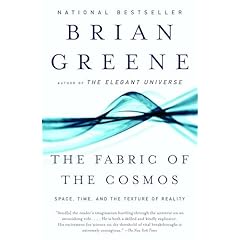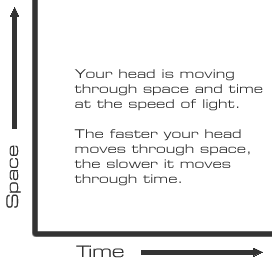Why time slows down when approaching the Speed of Light.
 Thu, July 12, 2007 at 3:48 PM
Thu, July 12, 2007 at 3:48 PM  Ok, so you’ve heard that nothing can travel faster than the speed of light. (That’s not quite true. The expansion of the universe allows for faster than light travel but that’s another post.) You’re also aware that time slows down the closer you get to the speed of light. You know, the ‘One twin goes off to Alpha Centauri at the speed of light and comes back after 80,000 years but he’s only aged 3 months’ story.
Ok, so you’ve heard that nothing can travel faster than the speed of light. (That’s not quite true. The expansion of the universe allows for faster than light travel but that’s another post.) You’re also aware that time slows down the closer you get to the speed of light. You know, the ‘One twin goes off to Alpha Centauri at the speed of light and comes back after 80,000 years but he’s only aged 3 months’ story.
Ever wonder why? Here’s the crib notes.
Everything in the universe always travels exactly at Light Speed. Always.
Time dilation: Special relativity declares a law for all motion: The combined speed of any object’s motion through space and it’s motion though time is always precisely equal to the speed of light.
 That’s right, everything. You, me, the computer screen you’re looking at, your grandma’s French toast, Santa Clause… everything.
That’s right, everything. You, me, the computer screen you’re looking at, your grandma’s French toast, Santa Clause… everything.
Everything is traveling through Spacetime: space (the three dimensions we experience and the nine others that m-theory predicts) and time.
Adding the total movement through both space and time always equals light speed. Always. Always. Always.
Space and Time do not exist seperately, the are parts of the same thing, Spacetime.
Since you must travel constantly at exactly the speed of light, when you increase your speed through space, you decrease your speed through time.
Your head (and the rest of you) is traveling through spacetime at the speed of light. But, when you’re at rest (not accelerating) all of your head’s movement is through time, none of it is traveling (accelerating) through space. Every time your head moves (accelerates) through space; in a car, in a plane, in a spaceship… even nodding up and down, some of it’s movement in time is lost since it is now moving through space.
Cool huh.
What about light?
Since light waves use all of their motion to travel through space at Light Speed, they have absolutely no motion through Time. Every photon that has ever been produced exists in an ageless state. (To us, the light seems to move through time but to the photon, time is standing still. This is one of the seemingly odd realizations fo Ensteins Theory of Relativity.) That's why poton's from the early universe don't 'fade out' or do something else. They can't, since for them, time is at a standstill.
The universe ages, light does not.
 83 Comments | | posted in
83 Comments | | posted in  Science | tagged
Science | tagged  Light Speed,
Light Speed,  Time Dilation,
Time Dilation,  Why Time Slows Down Near Light Speed
Why Time Slows Down Near Light Speed 


Reader Comments (83)
It just doesn't seem to fit...
your explanation was good and it makes sense alot! wow~
Example is a car traveling past you, at our accustomed speeds a car is normal sized but if it was traveling just under the speed of light- it's wheel base would appear far shorter to a still observer. If it instantly stopped the front bumper would instantly expand forward to normal size to the observer.
I have spent the last few days working to wrap my head around space-time, and some problems related to it. It just dawned on me that though I know that time is supposed to slow down, I didn't know the mechanism thereof. So now I know the mechanism (which was, by the way, so extraordinarily well explained that it makes me feel rather foolish for not already knowing) but again, I feel I must take one more step back.
Why? Why does Einstein assert that the total speed through time and space must equal C? Also, if we can't observe the vector 'time', then couldn't C have an unknown component of time travel as well, that would fundamentally alter our assumptions here?
I have other questions but they are somewhat unrelated, so I will save them for another day.
Thank you all in advance.
If you walked to your refrigerator, it would take you 5 seconds. If you instead looked at your refrigerator from your chair, that would represent traveling to it at the speed of light). SO, to the refrigerators reference, you'd be 5 seconds older if you walked there, but you'd be 5 seconds younger if you got there at the speed of light.
The choice is yours...
________________
What a complete nonsensical statement. "GOD" made time? An unseen, unproven, deity who lives in the sky and apparently loves everyone and have a plan for the entire universe...MADE time? I find your statement a bit far fetched, I'll take the scientific explanation thanks!
That's why if you are playing a fun game, time will go by faster. Your enjoyment leads to increased stimulation and less perception of time, so you don't perceive how long it's been as much as other people.
Whereas someone watching the clock tick will feel as if time's going slowly because they are sitting there perceiving every single second. Time is perception, and we can't yet comprehend how our own brains work.
The idea of speed reducing Atomic Decay is interesting, because it would explain time-travel in a realistic sense.
I.E: The increased speed reduces your Atomic Decay and the lack of things to compare time to lead to a faster perception of time so that something that feels like a day may be a year on Earth, if you were travelling at the speed of light.
However, this then leads us to believe that how come some very famous NASA experiments with Stop Watches on Rockets have led to them being slightly ahead? It wasn't significant enough to be like "Oh my god, I'm in the future" but it definitely shows that time travel does exist in some miniscule form. (Miliseconds are the best results at the moment).
Maybe in the future, time travel will be possible, but as has been stated, we can only go forwards and not backwards.
If you are standing absolutely still, you are still move through time. But time does not exist alone. Space does not exist alone either. The 2 things we think we understand from everyday experience are not what they appear to be.
Each moment is a slice of time in a position in space.
But how fast is spacetime? The answer is C
So if you accelerate through spacetime, it would seem you would travel faster than C.
It would seem logical that you would travel C + your acceleration.
But C is the ultimate speed. So something has to give.
Your slice of spacetime will always move you at C, so when you accelerate you don't go above C, you reduce your time and always keeping C constant. The faster you move through Space, the slower you move through Time.
Don't get hung up on the term C being the speed of light
C is just a speed
Light is something that moves at C
But to understand the concept of time dilation, light is not involved.
We're dealing with an absolute constant speed
And this speed is the movement of spacetime
Since you can't exceed C, any movement you make in space will reduce your movement through time
The movement of Light has all it's motion is through space, NOT through time
Which always equals C
A stays at earth, B is about to go on a long travel. The guy A waves goodbye to the guy B and sets their watch to same time, lets say 12 PM
B sits on a spaceship and goes on a voyage Andromeda galaxy. The person B hits the atomic nitro booster and travel in a light speed. For B, it takes only 5 seconds.
So, now, if I am the Guy A, I would never meet the Guy B because for me, it takes thousands and thousands of years to go to Andromeda. But for B, it is just 5 seconds. So when B returns, he will definitely meet my great great great great x 1000 children. Right??????
But the thing is, why there is a time difference? The guy B can travel that much of distance and come back 5 seconds later to the Guy A and show the photographs of the galaxy? The Guy just had to wait 5 seconds??
I am little confused so I hope you will clear this out for me.Thanks
Lets say,
If you take a walk, a simple ordinary walk.... What is really happening?
You are moving in space.
Is your clock ticking while you walk?
Then you are also moving through time.
Together they form space-time. It took an Einstein to figure this out.
So simple - you ALWAYS move through a specific moment in time and through a particular position in space.
So now, how fast are you walking? 3mph maybe 4mph
Light travels at 186,000 mps (that's miles per second, not mph) because that's how fast spacetime moves.
The max speed of anything is within the realm of spacetime.
So if you took that same 3mph walk on a beam of light would you be walking at 186,000 mps + 3mph?
No, impossible to travel faster than spacetime.
What happens is that your faster motion through space is transferred into a slower motion through time.
Got it?
When you move through space, you reduce your motion through time.
Think about your question now.... Hope this helps!